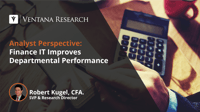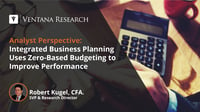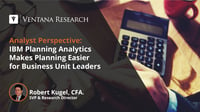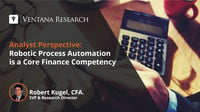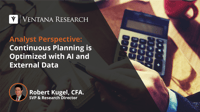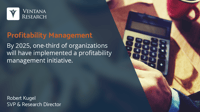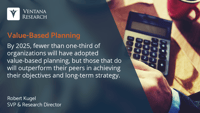Ventana Research recently announced its 2022 Market Agenda for the Office of Finance, continuing the guidance we have offered since 2003 on the practical use of technology for the finance and accounting department. Our insights and best practices aim to enable organizations to operate with agility and resiliency, improving performance and delivering greater value as a strategic partner.
Read More
Topics:
Office of Finance,
Business Intelligence,
Collaboration,
Business Planning,
Financial Performance Management,
ERP and Continuous Accounting,
Revenue,
blockchain,
robotic finance,
Predictive Planning,
lease and tax accounting,
AI & Machine Learning,
profitability management
A year of business uncertainty, lockdowns and operational disruptions forced finance and accounting organizations to adapt and change in many ways that are proving to be permanent. The need to operate virtually resulted in some organizations accelerating their adoption of technology, bringing them closer to achieving a transformation of the finance and accounting function: reshaping the department into an organization that is more forward-looking and strategic. Strategic in the sense of...
Read More
Topics:
Office of Finance,
Business Intelligence,
Data Governance,
Data Preparation,
Business Planning,
Financial Performance Management,
ERP and Continuous Accounting,
blockchain,
robotic finance,
Predictive Planning,
AI & Machine Learning
Business process reengineering (BPR) was a consulting fashion in the early 1990s that spurred many companies to purchase their first ERP systems. BPR proposes a fundamental redesign of core business processes to achieve substantial improvements in market and customer responsiveness, productivity, cycle times and quality. Those early ERP systems provided a platform to manage cross-functional business processes with much greater flexibility and efficiency than had been possible in the past,...
Read More
Topics:
Office of Finance,
Business Planning,
Financial Performance Management,
ERP and Continuous Accounting,
Revenue,
robotic finance,
Predictive Planning,
lease and tax accounting
The objectives of zero-based budgeting are well aligned with what I call integrated business planning, a technology-enabled approach to managing the forward-looking activities of a corporation including forecasting, planning and budgeting. IBP enables every business unit to plan their business in a way that makes sense to them but also makes the numbers in those plans available for company-wide planning, budgeting analysis and reporting. IBP combines operational planning and financial budgeting...
Read More
Topics:
Office of Finance,
Business Planning,
Financial Performance Management,
robotic finance,
Predictive Planning
IBM Planning Analytics, formerly known as TM1, is a comprehensive planning and analytics application designed to integrate and streamline an organization’s planning processes. It can support multiple planning use cases on a single platform, including financial, headcount, sales and demand planning. The software automates enterprise-wide data collection to make it repeatable and scalable across multiple users and departments. It supports sophisticated driver-based modeling that enables rapid...
Read More
Topics:
Office of Finance,
embedded analytics,
Analytics,
Business Intelligence,
Collaboration,
Business Planning,
ERP and Continuous Accounting,
Predictive Planning,
AI & Machine Learning
Robotic Process Automation (RPA) has emerged as a core digital technology for finance and accounting organizations. It can drive significant gains in productivity and efficiency by automating mechanical, repetitive accounting processes in a continuous, end-to-end fashion. RPA improves efficiency, ensures data integrity and enhances visibility into processes.
Read More
Topics:
Office of Finance,
Business Planning,
Financial Performance Management,
Price and Revenue Management,
ERP and Continuous Accounting,
robotic finance,
Predictive Planning
Ventana Research recently announced its 2021 market agenda for the Office of Finance, continuing the guidance we’ve offered since 2003 on the practical use of technology for the finance and accounting department. Our insights and best practices aim to enable organizations to operate with agility and resiliency, improving performance and delivering greater value as a strategic partner.
Read More
Topics:
Office of Finance,
enterprise profitability management,
Business Intelligence,
Collaboration,
Business Planning,
Financial Performance Management,
ERP and Continuous Accounting,
Revenue,
blockchain,
robotic finance,
Predictive Planning,
lease and tax accounting,
virtual audit,
virtual close,
AI & Machine Learning
In the context of planning, budgeting and benchmarking, external data includes information about the world outside an organization such as economic and market statistics, competitors and customers. Today, a comprehensive set of external data is a “nice to have” item in most organizations, but that’s likely to change. External data is necessary for useful and accurate business-focused planning and budgeting, and for performance benchmarking. It is also essential for the effective applications of...
Read More
Topics:
Information Management,
Business Planning,
Financial Performance Management,
Predictive Planning,
AI & Machine Learning
One of the oddities of corporate management is that, as a rule, nobody oversees managing profitability. CEOs are accountable for meeting company-wide financial targets and assign responsibility for achieving profitability levels to business unit owners across and down an organization. Sales quotas designed to achieve revenue goals are put in place, and budget owners have cost and margin objectives. But setting profitability objectives is not the same as managing profitability.
Read More
Topics:
Office of Finance,
Sales Performance Management (SPM),
Financial Performance Management,
Price and Revenue Management,
Digital Commerce,
Predictive Planning,
Subscription Management
In preparing this research note I took the precaution of searching “value-based planning” to see what came up. Over the years, the term has been used in several contexts each with different shadings. By my definition it’s an approach to planning and budgeting that maximizes the long-term value of an organization by considering all its objectives – not just the financial targets. Value-based planning is a more effective management tool for executives because it defines objectives in terms of...
Read More
Topics:
Office of Finance,
Financial Performance Management,
Predictive Planning


